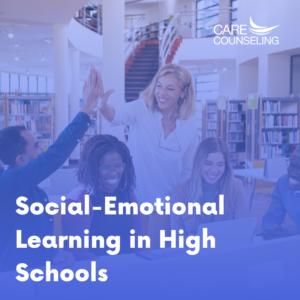Social-Emotional Learning in High Schools
 In the dynamic landscape of education, the focus is no longer confined to academics alone. Today, educators recognize the profound impact of social-emotional learning (SEL) on students’ overall development and success. Let’s explore the significance of integrating social-emotional learning into high school curricula and provide educators with practical strategies to embark on this transformative journey.
In the dynamic landscape of education, the focus is no longer confined to academics alone. Today, educators recognize the profound impact of social-emotional learning (SEL) on students’ overall development and success. Let’s explore the significance of integrating social-emotional learning into high school curricula and provide educators with practical strategies to embark on this transformative journey.
Understanding the Significance of Social-Emotional Learning in High Schools:
- Holistic Development:
– High school is not just about academics; it’s a period of identity formation and personal growth. SEL equips students with the emotional tools needed to navigate challenges and relationships effectively.
- Preparation for Life:
– Life beyond high school requires more than subject knowledge. SEL imparts skills like communication, problem-solving, and decision-making—critical for success in college, careers, and personal relationships.
- Emotional Resilience:
– Adolescence is rife with emotional ups and downs. SEL equips students with coping strategies, resilience, and stress management techniques that last a lifetime.
- Building Empathy and Connection:
– SEL fosters empathy and understanding, helping students build meaningful connections and contributing to a more compassionate society.
Strategies for Integrating Social-Emotional Learning in High School Curricula:
- Embed SEL in Classroom Discussions:
– Infuse SEL topics into regular class discussions, whether through literature, current events, or ethics. This encourages students to engage with real-world situations and emotions.
- Dedicated SEL Lessons:
– Allocate specific class time to explore SEL concepts, allowing students to delve deep into topics like self-awareness, emotional regulation, and conflict resolution.
- Incorporate SEL Literature:
– Choose books or stories that address emotions, relationships, and personal growth. Literature can serve as a catalyst for meaningful discussions.
- Collaborative Projects:
– Assign group projects that require cooperation, communication, and conflict resolution. This mirrors real-world scenarios and hones interpersonal skills.
- Mindfulness Practices:
– Introduce mindfulness activities, such as deep breathing exercises or brief meditation, to help students manage stress and enhance their focus.
- Peer-Led SEL Workshops:
– Empower students to lead workshops on SEL topics. This not only enhances their leadership skills but also fosters a student-driven approach to emotional growth.
- Service-Learning Projects:
– Engage students in community service projects that promote empathy, social responsibility, and a sense of purpose.
- Use Technology Thoughtfully:
– Utilize educational apps or platforms that offer SEL resources, quizzes, and interactive activities to engage students in self-reflection and learning.
- Guest Speakers and Experts:
– Invite guest speakers or mental health professionals to discuss SEL topics and share practical strategies for emotional well-being.
- Journaling and Reflection:
– Encourage students to maintain journals where they can express their thoughts, emotions, and experiences. Reflection prompts can stimulate self-awareness.
- Role-Playing Scenarios:
– Organize role-playing exercises that allow students to navigate challenging situations, practice active listening, and develop empathy.
- Conflict Resolution Workshops:
– Teach students effective conflict resolution strategies, emphasizing active listening, compromise, and empathy.
- Personal Development Plans:
– Guide students in creating personal development plans that encompass emotional goals, strengths, and areas for growth.
- Individual Check-Ins:
– Schedule one-on-one check-ins with students to discuss their emotional well-being, challenges, and aspirations.
- Parent Involvement:
– Engage parents in SEL initiatives, providing them with resources to support their children’s emotional growth at home.
Integrating social-emotional learning into high school curricula is a transformative step toward preparing students for the complexities of life beyond the classroom. By focusing on skills like self-awareness, empathy, decision-making, and relationship-building, we empower students to navigate challenges with resilience, compassion, and emotional intelligence.



























